February 10th, 2021
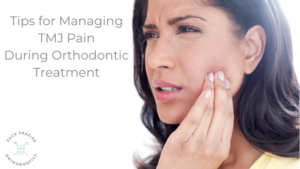
According to the National Institute of Dental and Craniofacial research, the prevalence of TMJ problems (also known as temporomandibular joint and muscle disorder) is between 5% - 12% of the population. It is more common in females than males, and tends to affect younger people more often.
While orthodontic treatment does not cause TMJ issues, studies also show that it cannot prevent or treat TMJ pain either. Here are some common questions that you may have if you are in orthodontic treatment and are now experiencing some jaw joint pain.
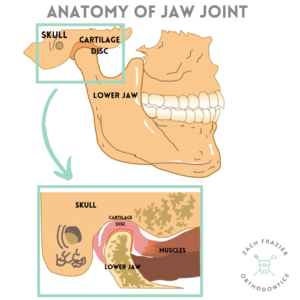 What does TMJ stand for and what is it?
What does TMJ stand for and what is it?
- TMJ stands for temporomandibular joint. It is located directly in front of your ears, and it is where your lower jaw hinges upon opening and closing.
What are TMJ problems?
- TMJ problems include clicking/popping joints, painful joints, or restricted jaw movement. TMJ problems may vary in severity from mild pain to severe pain, and the pain may be a temporary pain or a constant pain. TMJ problems may be related to the actual joint (bones and ligaments), or it may be related to the muscles around the joint.
What causes TMJ problems?
- TMJ problems may be caused by an injury to the face or jaw, grind/clenching of teeth, stress, muscle fatigue or overuse of the jaw joint. Additionally, it is linked to hormonal changes in women that cause laxity of the ligaments in the jaw joint. TMJ problems are most common in teenage girls and young women.
What can I do to improve my TMJ problems or TMJ pain?
Most TMJ problems can be managed by these conservative measures:
- Maintain a soft diet, and avoid chewy food and chewing gum.
- Use warm, moist heat on the jaw muscles to increase blood flow and massage the muscles. Alternate the warm moist heat with an ice pack on the joint area which will help reduce inflammation of the joints.
- Use anti-inflammatory medications to help reduce pain and inflammation. Ibuprofen is the most common, but you should consult your physician with which anti-inflammatory medication is best for you.
- Avoid clenching your teeth by setting up reminders to keep your teeth apart and jaw muscles relaxed.
- Monitor your stress and manage it to avoid muscle tension and clenching.
What if my symptoms do not improve with conservative therapy?
- If your symptoms are not improving, a referral will be made to another doctor who specifically manages TMJ problems. They may recommend more diagnostic imaging (like an MRI) to evaluate the jaw joint to find the cause of the problem. In some cases, a night guard may be recommended to help alleviate some pain.
Can I continue my orthodontic treatment?
- In some cases, orthodontic treatment may be paused for a period of time, and occasionally it may be discontinued depending on the circumstances. The recommendations are on a case by case basis.
If you have any other questions, please let your orthodontist know. More often than not, a little patience and conservative measures will improve the TMJ pain, so hang in there : )
Tags: Adult Orthodontic Treatment, Braces Tips, Downers Grove IL, Downers Grove orthodontist, Dr. Zach Frazier, Health Tips, Invisalign Tips, Jaw joint pain, Teen Orthodontic Treatment, TMD, TMJ, TMJ pain, TMJD
Posted in Patient education, Tips | No Comments
April 7th, 2020
Hey ZFO fans : )
Given the circumstances of our temporary office closure, I wanted to give some information that you may find helpful.
I understand the need for guidance with your orthodontic treatment, so we have made created another way to stay in touch with you. We are now available to do virtual visits by appointment. Here is what you need to know should you be interested:
1) If you have an appointment that has already been postponed or rescheduled, you will get an additional email with links to video instructions. Please watch the videos : )
2) If your appointment is in the month of April, your additional email will come the week you were due to see us.
3) After watching the videos, if you wish to have a visit with me, please send an email request. We can meet via phone or video conference, or we can simply continue to communicate via email.
4) Note: our email and video conferencing application (Doxy.me) are HIPAA compliant and secure.
Q: What are you looking for in the photos we send?
A: I can assess brushing, rubber band wear, and some general progress.
Q: Can the virtual appointment replace my in-office visit?
A: No, we will still need to see you in person once we are open.
Q: Is the virtual appoinment required or can i just wait for an in-office visit?
A: No, the virtual appointment is optional.
Q: I had a consultation scheduled - can I still reach out to meet virtually?
A: Yes, we would love to meet you and start the conversation regarding your needs! Our in-office visit is still required once we are open.
Q: I have an urgent need and/or pain from my orthodontic appliances - can I be seen?
A: Yes, we are able to see you in our office for emergencies and urgent needs. Please call us.
While we are disappointed that we are closed, we understand that it is the responsible thing to do given the current situation. Please keep up to date with the CDC and please stay at home to follow the social distancing guidelines. We are all in this together. Stay healthy and please reach out with any questions - I am still here for you guys! I look forward to speaking with some of you soon : )
Take care,
Dr. Zach
March 18th, 2020
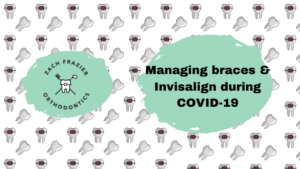
With the recent outbreak of COVID-19 (Coronavirus), dental and orthodontic offices around the nation are closing due to recommendations by the American Dental Association. While offices remain open for emergency care, many people have questions about how to manage their ongoing orthodontic treatment with braces or Invisalign. Here are a few guidelines to help you out : )
GENERAL GUIDELINES:
- Wash your hands very often!
- Orthodontic treatment involves putting your hands in your mouth. Whether you are placing rubber bands, wax, retainers, or an Invisalign clear aligner, you need to put your hands in your mouth. You should be washing your hands for at least 20 seconds BEFORE AND AFTER putting your hands in your mouth. Additionally, you should be washing your hands, in general, more often.
- If you can't wash your hands, use hand sanitizer
- If soap and water are not available, be sure you use hand sanitizer with at least 60% alcohol content. Rub all surfaces of your hands well.
- Avoid touching your face with unwashed hands
- Do not touch your eyes, nose, or mouth with unwashed hands.
- Stay at home and follow the CDC guidelines for social distancing
- The illness is spread by close contact with other people or via droplets in the air. Please do not use this time away from work or school to spend time with friends and family. Many people who have the virus do not know it!
- If you are getting sick, contact your medical health care provider for help.
- If you are sick, first and foremost, stay away from others so you do not spread the illness to them. Contact your medical professional for advice on what to do next. They are your best resource of information on where to go to get help.
For any significant pain or concern, please call or email Dr. Zach as we are still available to help you out. Here are some common questions we are getting about braces, Invisalign, and retainers:
BRACES - COMMON QUESTIONS
- Should I wear my rubber bands?
- Yes! For now continue to wear rubber bands as instructed to continue your progress.
- What if I run out of rubber bands?
- Call or email our office - we can arrange a pick up!
- What should I do if I have a broken brace?
- If you are not in pain, you can attempt to remove the brace or place wax on it to stabilize the brace. If it is causing a significant discomfort that makes it difficult to eat or sleep, please call us and we can arrange an emergency visit to get you comfortable. Unfortunately at this time, we cannot fix broken braces but we can get you comfortable again.
- What should I do if I am in pain?
- Call or email our office - we will set up an emergency appointment to adjust the braces to get you comfortable again.
- Will the COVID-19 shut down delay my treatment?
- It depends on how long we are closed, but in the meantime, make sure you do the following:
- Continue to brush your teeth 3 times per day
- Avoid hard and sticky foods to ensure nothing is broken
- Wear your rubber bands as instructed
- What if I have a question or something does not seem right?
- Call or email us - Dr. Zach is available for questions : )
- Other tips:
- Dispose of your used rubber bands and wax properly - do not put them on counters or clean surfaces
- Since you are home, brush your teeth and floss them more often. Be sure to wash your hands before and after
- Avoid sugary drinks to protect your teeth from white spots
INVISALIGN - COMMON QUESTIONS
- Should I continue to wear my aligners?
- Yes! For now, continue to wear aligners as instructed to continue your progress.
- If I have rubber bands, should I wear those too?
- Yes! For now continue to wear rubber bands as instructed to continue your progress.
- What if I run out of aligners?
- Please give us a call and we can arrange a pick up if we have more in the office. In the event it was the last of the box, we will have to wait for another 3D scan to order more. If you are on your last aligner for awhile, please be sure to clean it more often.
- Can I clean them with soap and water?
- Yes! You can use hand soap to clean your aligners with cold water.
- What if something does not seem right?
- Give us a call or send an email - Dr. Zach is available for questions : )
- Other tips:
- Clean and brush your aligners more often during this time
- Clean your Invisalign retainer case often
- Be sure to carry your hand sanitizer with you
- Do not set your Invisalign down on any unclean surfaces
PALATAL EXPANDERS
- Should I keep turning the expander?
- No, at this time, if you have not been instructed to continue your turns, you should stop and wait until your next appointment with Dr. Zach.
- Is it OK to leave it in place?
- Yes. The expander is usually in for 9-10 months.
- What if my child was due to have it removed during the closure?
- Please be patient and sit tight. A few extra weeks will not cause any harm.
- What if it is causing pain or discomfort?
- Please call our office and we will be happy to help you out : )
RETAINERS - COMMON QUESTIONS
- Should I continue to wear my retainer?
- Yes! Please continue as instructed by Dr. Zach
- Can I clean my retainer with soap and water?
- Yes! You can use hand soap and cold water to clean your retainer. It is a good idea at this time to keep it as clean as possible. You should clean both before and after using it.
- What if I lost my retainer?
- If you lost your retainer and you have your 3D printed model of your teeth, please give us a call and we may be able to make you a new one. We would have to arrange a drop-off/pick-up.
- Other tips:
- Clean and brush your retainers more often during this time
- Clean your retainer case often
- Do not set your retainers down on any unclean surfaces
If there is any other question you have, let us know! We are here to help you and we can't wait to see your smile again : )
January 23rd, 2020

Ah, sparkling water - so refreshing with its effervescence! With the popularity of sparkling drinks, I often get the question:
Will sparkling water harm my teeth?
The truth is, any drink with carbonation is going to have a higher acid level. Higher acid levels are not good for your teeth as they can wear away the enamel over time. Acid causes tooth erosion and decay. However, researchers have been looking into this to see if the acid content is enough to weaken your teeth.
The short answer is - no, drinking sparkling water will not harm your teeth.
According to the latest studies, they find that in general, drinking plain, sparkling water will not have a significant effect on the enamel of your teeth. Compared to regular tap water, it essentially has the same long term effect.
Here's the catch and what you need to know for your teeth and orthodontic treatment...
- Everything should be enjoyed in moderation. While sparkling water is fine, regular water is still your best bet as it is great for your overall health and contains fluoride which will help fight against tooth decay.
- Sparkling water is not all the same - some companies add sugar and citrus flavors. The sugars and citrus flavors do make the drink more acidic, and therefore may put the teeth more at risk if they are sipped throughout the day. The more exposure your teeth have to acidic, sugary, carbonated drinks, the greater the risk for enamel wear.
- With the growing popularity of Invisalign treatment, many adults want to know if they have to remove their clear aligners to have a sparkling water drink. Basically, if the sparkling water is plain, it should have a significant effect on the teeth (once again, practice moderation). However, be aware that citrus-flavored or added sugar can sit under the Invisalign aligner which can lead to issues with the enamel.
Questions or interested to learn more about diet recommendations with orthodontic treatment? Let us know - we are here to help : )
December 1st, 2019
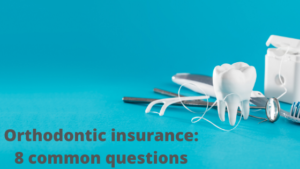
Orthodontic insurance coverage can be very confusing to say the least. There are many nuances to the coverage, and it may vary year to year depending on your employer and the insurance company. Here are a few of the most common questions we are asked about insurance coverage for braces and Invisalign.
- How much of treatment is covered?
- It depends on the policy that has been chosen by your or your employer. It may vary greatly, with many policies covering approximately $1000 - $2500 per person on the policy.
- How does insurance pay out the benefit?
- Insurance usually pays the lifetime benefit over the course of treatment in monthly installments. It is not typical for them to pay it all out at once at the beginning of treatment, so to receive the full benefit, the plan must be active for the entire course of treatment.
- Is adult orthodontic treatment covered by insurance?
- In many instances, yes. This certainly depends on the insurance plan and the options chosen by your employer.
- Is Invisalign treatment covered by insurance?
- Yes, it is considered orthodontic treatment and can be applied to your lifetime orthodontic benefit.
- Should I be concerned my insurance will not pay their amount?
- No, the vast majority of claims are paid as expected. However, there are no guarantees. If there is a problem, the office can try to resolve it, or you may have to call the insurance company to resolve any payment discrepancies.
- What if my insurance does not pay as much as expected?
- In the case of underpayment, the remaining balance is owed by the patient for the services.
- What if I get new insurance during my treatment?
- Some insurances have a "work in progress" policies that allow the new insurance to pick up the coverage. In other cases, the new insurance may consider it an existing condition and may opt to not cover. Calling your insurance company before switching is always a good idea.
- How will I know insurance is making payments?
- Explanation of Benefits (EOBs) are sent to both the orthodontist and the patient so that you can review the payments being made on your behalf.
At Zach Frazier Orthodontics, we extend the extra courtesy to deal directly with your dental insurance provider. We verify and submit your insurance for you so that you do not have to deal with the hassle of filing insurance claims. If we expect insurance to cover a portion of your treatment, we will collect directly from them to reduce your monthly payment to make treatment more affordable.
Have more questions about dental insurance? Feel free to reach out - we are happy to help : ) We are experienced in helping many patients with braces and Invisalign in Downers Grove!
Tags: Adult Orthodontic Treatment, Braces, Braces Tips, Dental Insurance, Downers Grove orthodontist, Early Orthodontic Treatment, Invisalign, Invisalign Tips, Orthodontic Insurance, Teen Orthodontic Treatment
Posted in About Our Office, Tips | No Comments
November 8th, 2019
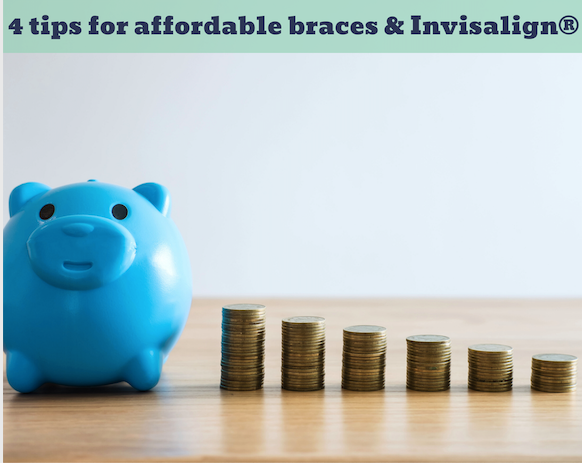
Hey parents - we get it. Finding room in the family budget for straight teeth is a challenge amongst everything else going on. Sports uniforms, piano lessons, iPhones, vacations - kids sure are expensive. And I totally understand - I have kids of my own, and there always seems to be something coming up.
Looking ahead to 2020, I want to help by giving you some honest and actionable advice to help you save on your orthodontic treatment. It may take a little research, but it will be well worth it in the end!
-
Employer Insurance Plans:
If you are looking at plans for 2020 and your employer offers an option with an orthodontic benefit, the best time to plan is now. Schedule a consultation with an orthodontist to see if your child will need braces in 2020. If they do, then you can do the math to see if the extra premium is worth it. If they don't, see if you can get a timeline of when he or she will be ready. This way you only pay the additional premium if you're going to use it.
-
Insurance Networks:
Many people do not realize it, but going to an in-network dentist has many advantages that are not often discussed. They are not discussed because many dentists do not participate with insurances. They may say "we work with your insurance," but the true value for you is when they are actually in-network. In many cases, your lifetime orthodontic benefit will be greater if you go to an in-network orthodontist, and their fees are set by the insurance company so they are very reasonable and fair. If you venture out-of-network, the provider can charge you literally whatever they want to!
-
Flexible Spending Accounts and Health Savings Accounts:
FSAs are a great way to take advantage of your employer benefits to help reduce some out-of-pocket costs on orthodontic treatment. Visit your orthodontist before you set your FSA limits for 2020 to find out how you can plan your payments. HSAs are also a great way to use pre-tax dollars to your benefit to pay for orthodontic treatment.
-
Payment Plans:
Most orthodontists will offer in-house financing with 0% interest on the monthly payments. This can be a huge advantage for a family trying to budget out the cost of braces or Invisalign® for multiple kids, so be sure to talk with the office to see how the payments can be arranged. You may be surprised to find out that offices are willing to finance beyond the treatment time or accept a small down payment as low as a couple hundred dollars. All you have to do is ask : )
At Zach Frazier Orthodontics, we take pride in our ability to make treatment affordable while maintaining the highest standards of care and customer service. How do we do it? Well, frankly, we are different than most offices in that we do the following:
As a member of the community, I would not be able to do my job any other way. My patients are your friends, your family, and your neighbors; and we are proud of our reputation. Feel free to send us a text or email - we are here to help you : )
#loveyoursmile
- Dr. Zach
Tags: Braces, Braces Tips, Community, Downers Grove IL, Downers Grove orthodontist, Dr. Zach Frazier, Early Orthodontic Treatment, Invisalign, Invisalign Tips, Teen Orthodontic Treatment
Posted in About Our Office, Community, Tips | No Comments
 What does TMJ stand for and what is it?
What does TMJ stand for and what is it?



